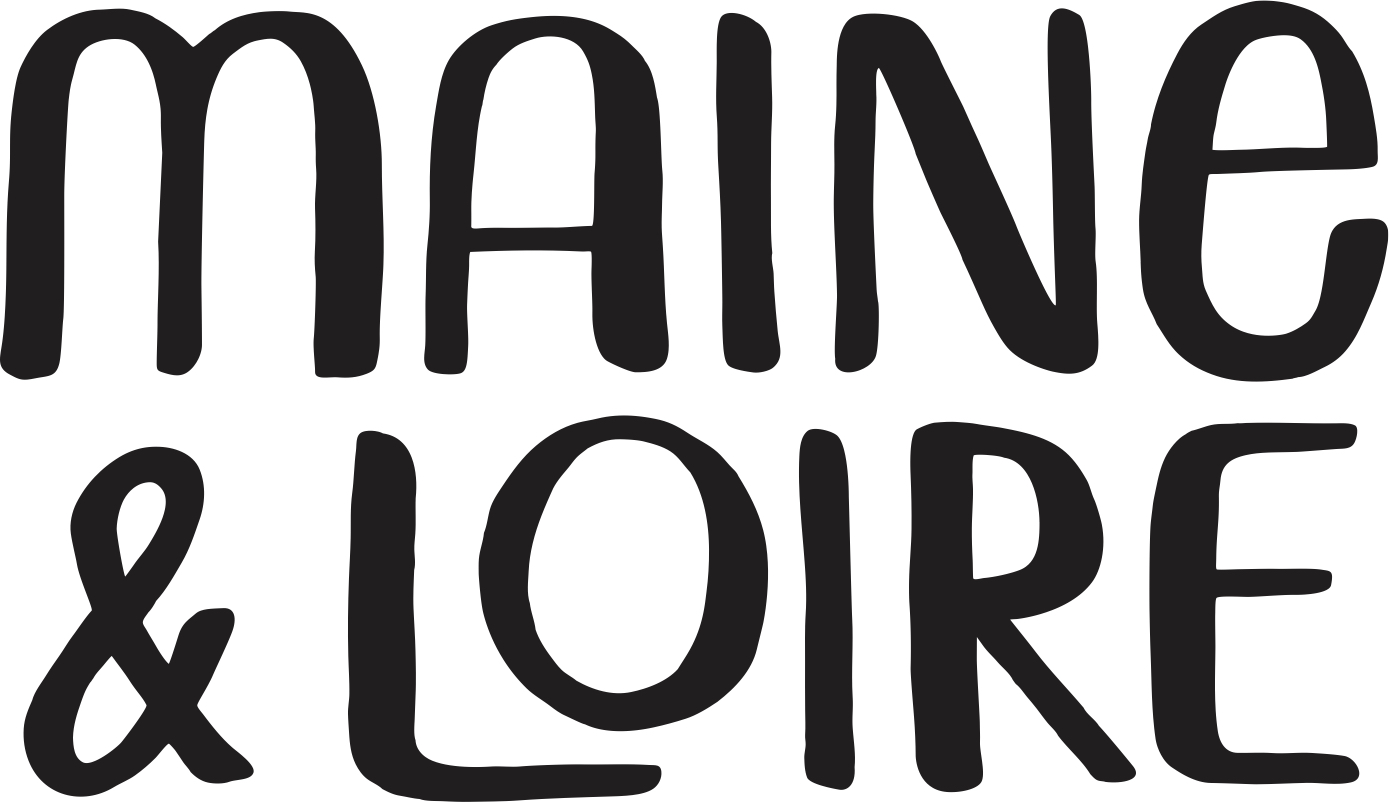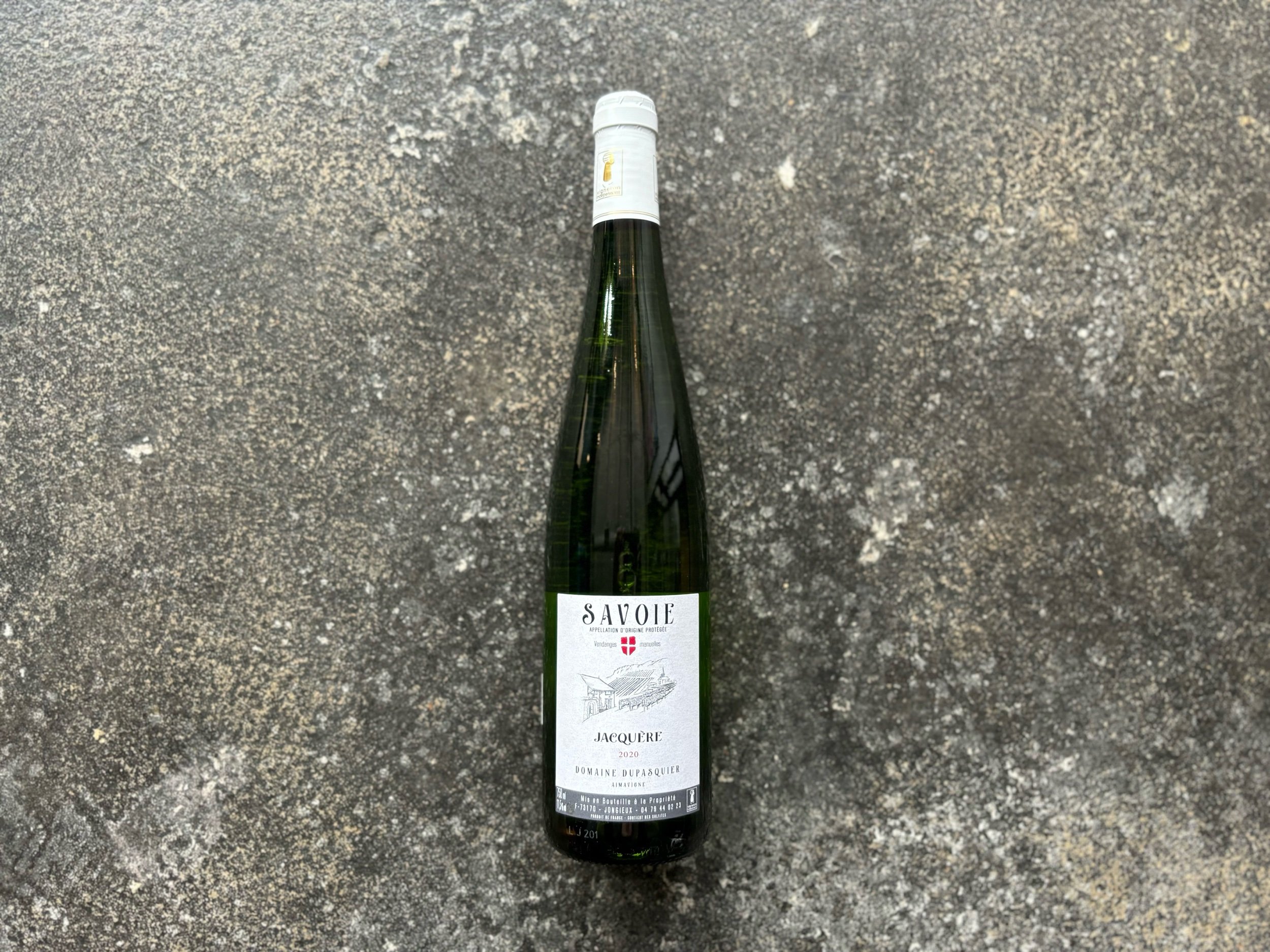Domaine Dupasquier Jacquère 2020
Location: France, Savoie
Winemaker: David Dupasquier
Grapes: Jacquère
Soil: Clay, limestone
From the Importer Selection Massale: David Dupasquier is a fifth generation winemaker at this ultra-traditional domaine. He and his sister Veronique run the domaine, but their father Noel is still very much involved in the vineyards and in the cellar.
The Dupasquier vineyards are located in a southewestern lobe of the Savoie, close to the Rhône Valley. One drives through a large mountain called ‘Le Dent du Chat’ to arrive at the domaine, and the terroir seems almost instantly to become more Rhône-ish on the western side of this tunnel. The town is called Aimavigne, and its most prestigious vineyard is the incredibly steep ‘Marestel’ Cru. The vines benefit from steep, sun-drenched slopes, primarily limestone soil, and the cooling effects of Lake Bourget. David works these vineyards with a tractor and by hand—the Marestel vines entirely by hand, as a good percentage of the best sites are too steep to work with a tractor. Plowing is done once per year for every other row and David believes that the biodiversity this leaves in the vineyard is critical for the quality of wines. Harvest is by hand and clusters are hand selected.
The word ‘traditional’ invariably gets used when Dupasquier’s wines come up in conversation. There are many reasons for this, one being that the wines see quite a long period of aging in old, neutral barrel and in bottle before release. In general, the Dupasquiers leave their wines in barrel on fine lees until just before the next year’s harvest. The wines then see another 18 months in bottle. In some other regions, this type of regimen might not be so unusual, but it certainly is in the Savoie, where the typical wine is fermented with added yeasts and vinified quickly in stainless steel. This brings us to another aspect of the Dupasquier’s traditionalism. All the wines are fermented with native yeast, and even in the coldest years, they don’t inoculate.
The style of these wines absolutely reflects the place, as well as the vineyard and cellar work. There’s a warmth and ripeness to the wines that calls the Rhône Valley to mind, yet with freshness, acidity, and cut reminiscent of the Savoie. ‘Perles d’Aimavigne’ is classic crémant de Savoie, full of shimmering effervescence and gentle citrus oils and sleek minerality rippling throughout.
Location: France, Savoie
Winemaker: David Dupasquier
Grapes: Jacquère
Soil: Clay, limestone
From the Importer Selection Massale: David Dupasquier is a fifth generation winemaker at this ultra-traditional domaine. He and his sister Veronique run the domaine, but their father Noel is still very much involved in the vineyards and in the cellar.
The Dupasquier vineyards are located in a southewestern lobe of the Savoie, close to the Rhône Valley. One drives through a large mountain called ‘Le Dent du Chat’ to arrive at the domaine, and the terroir seems almost instantly to become more Rhône-ish on the western side of this tunnel. The town is called Aimavigne, and its most prestigious vineyard is the incredibly steep ‘Marestel’ Cru. The vines benefit from steep, sun-drenched slopes, primarily limestone soil, and the cooling effects of Lake Bourget. David works these vineyards with a tractor and by hand—the Marestel vines entirely by hand, as a good percentage of the best sites are too steep to work with a tractor. Plowing is done once per year for every other row and David believes that the biodiversity this leaves in the vineyard is critical for the quality of wines. Harvest is by hand and clusters are hand selected.
The word ‘traditional’ invariably gets used when Dupasquier’s wines come up in conversation. There are many reasons for this, one being that the wines see quite a long period of aging in old, neutral barrel and in bottle before release. In general, the Dupasquiers leave their wines in barrel on fine lees until just before the next year’s harvest. The wines then see another 18 months in bottle. In some other regions, this type of regimen might not be so unusual, but it certainly is in the Savoie, where the typical wine is fermented with added yeasts and vinified quickly in stainless steel. This brings us to another aspect of the Dupasquier’s traditionalism. All the wines are fermented with native yeast, and even in the coldest years, they don’t inoculate.
The style of these wines absolutely reflects the place, as well as the vineyard and cellar work. There’s a warmth and ripeness to the wines that calls the Rhône Valley to mind, yet with freshness, acidity, and cut reminiscent of the Savoie. ‘Perles d’Aimavigne’ is classic crémant de Savoie, full of shimmering effervescence and gentle citrus oils and sleek minerality rippling throughout.
Location: France, Savoie
Winemaker: David Dupasquier
Grapes: Jacquère
Soil: Clay, limestone
From the Importer Selection Massale: David Dupasquier is a fifth generation winemaker at this ultra-traditional domaine. He and his sister Veronique run the domaine, but their father Noel is still very much involved in the vineyards and in the cellar.
The Dupasquier vineyards are located in a southewestern lobe of the Savoie, close to the Rhône Valley. One drives through a large mountain called ‘Le Dent du Chat’ to arrive at the domaine, and the terroir seems almost instantly to become more Rhône-ish on the western side of this tunnel. The town is called Aimavigne, and its most prestigious vineyard is the incredibly steep ‘Marestel’ Cru. The vines benefit from steep, sun-drenched slopes, primarily limestone soil, and the cooling effects of Lake Bourget. David works these vineyards with a tractor and by hand—the Marestel vines entirely by hand, as a good percentage of the best sites are too steep to work with a tractor. Plowing is done once per year for every other row and David believes that the biodiversity this leaves in the vineyard is critical for the quality of wines. Harvest is by hand and clusters are hand selected.
The word ‘traditional’ invariably gets used when Dupasquier’s wines come up in conversation. There are many reasons for this, one being that the wines see quite a long period of aging in old, neutral barrel and in bottle before release. In general, the Dupasquiers leave their wines in barrel on fine lees until just before the next year’s harvest. The wines then see another 18 months in bottle. In some other regions, this type of regimen might not be so unusual, but it certainly is in the Savoie, where the typical wine is fermented with added yeasts and vinified quickly in stainless steel. This brings us to another aspect of the Dupasquier’s traditionalism. All the wines are fermented with native yeast, and even in the coldest years, they don’t inoculate.
The style of these wines absolutely reflects the place, as well as the vineyard and cellar work. There’s a warmth and ripeness to the wines that calls the Rhône Valley to mind, yet with freshness, acidity, and cut reminiscent of the Savoie. ‘Perles d’Aimavigne’ is classic crémant de Savoie, full of shimmering effervescence and gentle citrus oils and sleek minerality rippling throughout.

